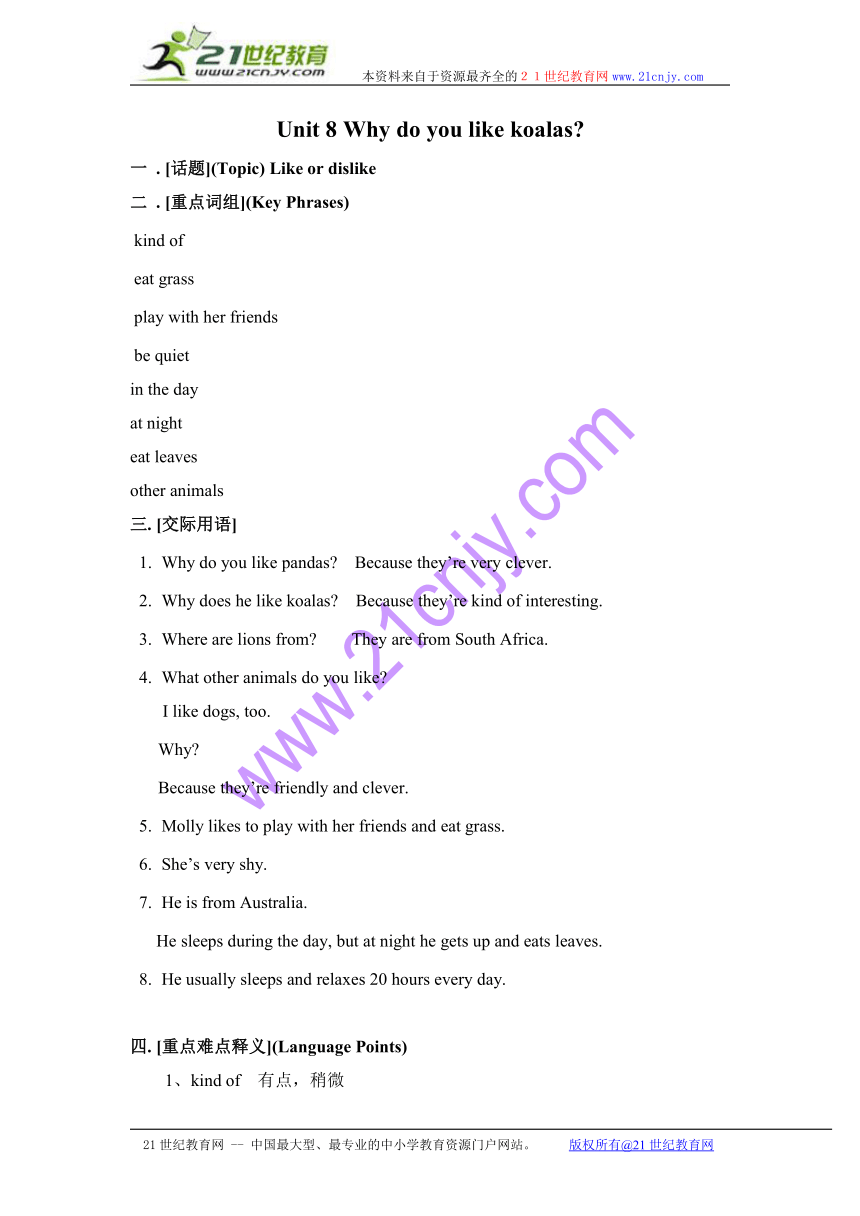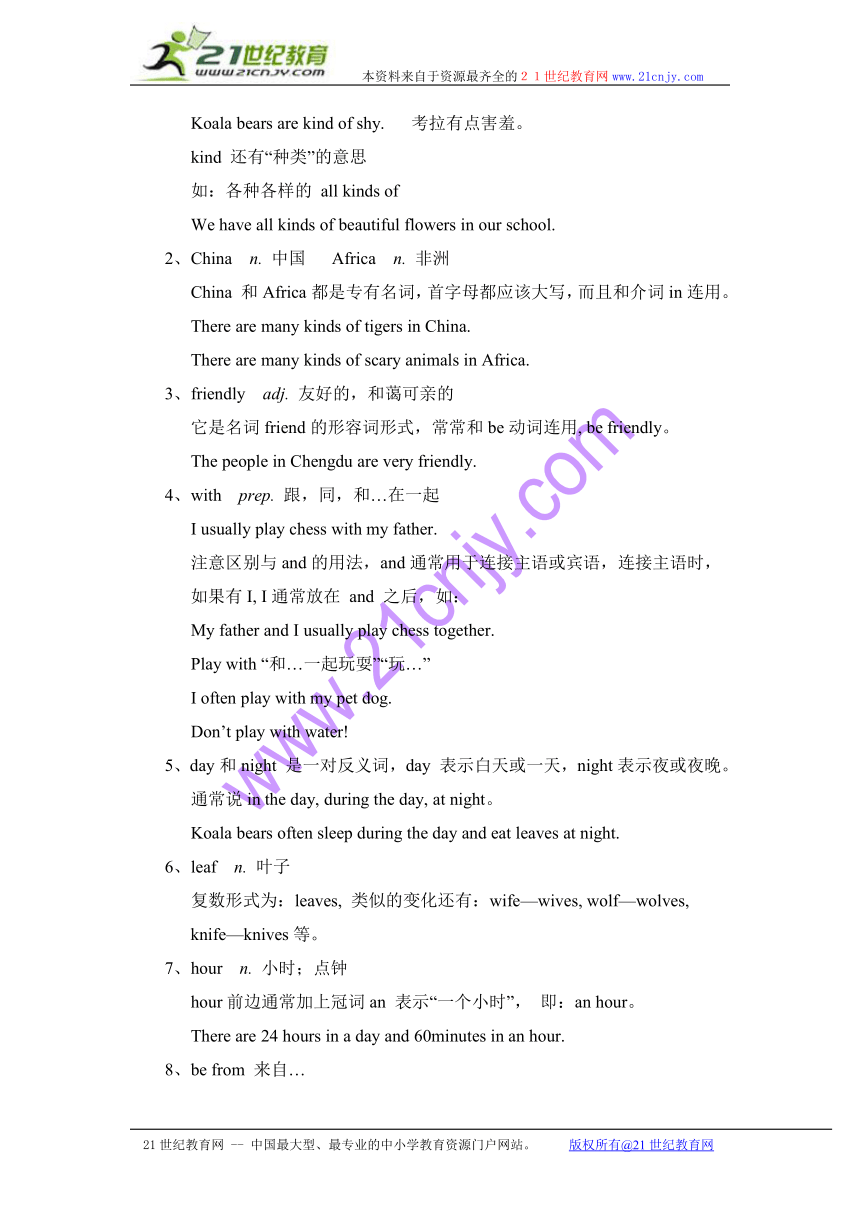英语:unit 8 why do you like koalas学案(鲁教版六年级下)
文档属性
| 名称 | 英语:unit 8 why do you like koalas学案(鲁教版六年级下) |  | |
| 格式 | rar | ||
| 文件大小 | 13.1KB | ||
| 资源类型 | 教案 | ||
| 版本资源 | 鲁教版(五四学制) | ||
| 科目 | 英语 | ||
| 更新时间 | 2009-08-18 20:50:00 | ||
图片预览


文档简介
本资料来自于资源最齐全的21世纪教育网www.21cnjy.com
Unit 8 Why do you like koalas
一 . [话题](Topic) Like or dislike
二 . [重点词组](Key Phrases)
kind of
eat grass
play with her friends
be quiet
in the day
at night
eat leaves
other animals
三. [交际用语]
1. Why do you like pandas Because they’re very clever.
2. Why does he like koalas Because they’re kind of interesting.
3. Where are lions from They are from South Africa.
4. What other animals do you like
I like dogs, too.
Why
Because they’re friendly and clever.
5. Molly likes to play with her friends and eat grass.
6. She’s very shy.
7. He is from Australia.
He sleeps during the day, but at night he gets up and eats leaves.
8. He usually sleeps and relaxes 20 hours every day.
四. [重点难点释义](Language Points)
1、kind of 有点,稍微
Koala bears are kind of shy. 考拉有点害羞。
kind 还有“种类”的意思
如:各种各样的 all kinds of
We have all kinds of beautiful flowers in our school.
2、China n. 中国 Africa n. 非洲
China 和Africa都是专有名词,首字母都应该大写,而且和介词in连用。
There are many kinds of tigers in China.
There are many kinds of scary animals in Africa.
3、friendly adj. 友好的,和蔼可亲的
它是名词friend的形容词形式,常常和be动词连用, be friendly。
The people in Chengdu are very friendly.
4、with prep. 跟,同,和…在一起
I usually play chess with my father.
注意区别与and的用法,and通常用于连接主语或宾语,连接主语时,
如果有I, I通常放在 and 之后,如:
My father and I usually play chess together.
Play with “和…一起玩耍”“玩…”
I often play with my pet dog.
Don’t play with water!
5、day和night 是一对反义词,day 表示白天或一天,night表示夜或夜晚。
通常说in the day, during the day, at night。
Koala bears often sleep during the day and eat leaves at night.
6、leaf n. 叶子
复数形式为:leaves, 类似的变化还有:wife—wives, wolf—wolves,
knife—knives等。
7、hour n. 小时;点钟
hour前边通常加上冠词an 表示“一个小时”, 即:an hour。
There are 24 hours in a day and 60minutes in an hour.
8、be from 来自…
be from = come from
Pandas are from China. = Pandas come form China.
9、meat n. (食用的)肉,为不可数名词,表示“许多”时,使用much来修
饰,即:much meat
He eats much meat every day.
10、grass n. 草, 为不可数名词,表示“许多”时,使用much来修饰,即:much grass。
There is much grass on the playground.
五. 语法知识
特殊疑问句通常以“what”、“who”、“which”、“when”、“where”、“how”、“how old”、“how many”等开头,对某一具体问题进行提问。
特殊疑问句的基本构成有两种情况:
1. 疑问句+一般疑问句结构。这是最常见的情况。例如:
What’s your grandfather’s telephone number
你爷爷的电话号码是多少?
Who is that boy with big eyes
那个大眼睛的男孩是谁?
Which season do you like best
你最喜欢哪个季节?
When is he going to play the piano
他什么时候弹钢琴?
Where does he live
他住在哪儿?
How are you
你好吗?
How old are you
你多大了?
How many brothers and sisters do you have
你有几个兄弟姐妹?
2. 疑问句+陈述句结构。这时疑问词作主语或修饰主语。例如:
Who is on duty today
今天谁值日?
Which man is your teacher
哪位男士是你的老师?
我们学过的What/How about+名词/代词+其他?也是特殊疑问句,它是一种省略结构。
例如:
I like English. What/How about you
我喜欢英语。你呢?
What about playing basketball
打篮球怎么样?
21世纪教育网 -- 中国最大型、最专业的中小学教育资源门户网站。 版权所有@21世纪教育网
Unit 8 Why do you like koalas
一 . [话题](Topic) Like or dislike
二 . [重点词组](Key Phrases)
kind of
eat grass
play with her friends
be quiet
in the day
at night
eat leaves
other animals
三. [交际用语]
1. Why do you like pandas Because they’re very clever.
2. Why does he like koalas Because they’re kind of interesting.
3. Where are lions from They are from South Africa.
4. What other animals do you like
I like dogs, too.
Why
Because they’re friendly and clever.
5. Molly likes to play with her friends and eat grass.
6. She’s very shy.
7. He is from Australia.
He sleeps during the day, but at night he gets up and eats leaves.
8. He usually sleeps and relaxes 20 hours every day.
四. [重点难点释义](Language Points)
1、kind of 有点,稍微
Koala bears are kind of shy. 考拉有点害羞。
kind 还有“种类”的意思
如:各种各样的 all kinds of
We have all kinds of beautiful flowers in our school.
2、China n. 中国 Africa n. 非洲
China 和Africa都是专有名词,首字母都应该大写,而且和介词in连用。
There are many kinds of tigers in China.
There are many kinds of scary animals in Africa.
3、friendly adj. 友好的,和蔼可亲的
它是名词friend的形容词形式,常常和be动词连用, be friendly。
The people in Chengdu are very friendly.
4、with prep. 跟,同,和…在一起
I usually play chess with my father.
注意区别与and的用法,and通常用于连接主语或宾语,连接主语时,
如果有I, I通常放在 and 之后,如:
My father and I usually play chess together.
Play with “和…一起玩耍”“玩…”
I often play with my pet dog.
Don’t play with water!
5、day和night 是一对反义词,day 表示白天或一天,night表示夜或夜晚。
通常说in the day, during the day, at night。
Koala bears often sleep during the day and eat leaves at night.
6、leaf n. 叶子
复数形式为:leaves, 类似的变化还有:wife—wives, wolf—wolves,
knife—knives等。
7、hour n. 小时;点钟
hour前边通常加上冠词an 表示“一个小时”, 即:an hour。
There are 24 hours in a day and 60minutes in an hour.
8、be from 来自…
be from = come from
Pandas are from China. = Pandas come form China.
9、meat n. (食用的)肉,为不可数名词,表示“许多”时,使用much来修
饰,即:much meat
He eats much meat every day.
10、grass n. 草, 为不可数名词,表示“许多”时,使用much来修饰,即:much grass。
There is much grass on the playground.
五. 语法知识
特殊疑问句通常以“what”、“who”、“which”、“when”、“where”、“how”、“how old”、“how many”等开头,对某一具体问题进行提问。
特殊疑问句的基本构成有两种情况:
1. 疑问句+一般疑问句结构。这是最常见的情况。例如:
What’s your grandfather’s telephone number
你爷爷的电话号码是多少?
Who is that boy with big eyes
那个大眼睛的男孩是谁?
Which season do you like best
你最喜欢哪个季节?
When is he going to play the piano
他什么时候弹钢琴?
Where does he live
他住在哪儿?
How are you
你好吗?
How old are you
你多大了?
How many brothers and sisters do you have
你有几个兄弟姐妹?
2. 疑问句+陈述句结构。这时疑问词作主语或修饰主语。例如:
Who is on duty today
今天谁值日?
Which man is your teacher
哪位男士是你的老师?
我们学过的What/How about+名词/代词+其他?也是特殊疑问句,它是一种省略结构。
例如:
I like English. What/How about you
我喜欢英语。你呢?
What about playing basketball
打篮球怎么样?
21世纪教育网 -- 中国最大型、最专业的中小学教育资源门户网站。 版权所有@21世纪教育网
同课章节目录
- Unit 1 When is your birthday?
- Section A
- Section B
- Unit 2 My favourite subject is science
- Section A
- Section B
- Unit 3 Can you play the guitar?
- Section A
- Section B
- Unit 4 What time do you go to school?
- Section A
- Section B
- Unit 5 How do you get to school?
- Section A
- Section B
- Unit 6 Don't eat in class.
- Section A
- Section B
- Unit 7 Why do you like pandas?
- Section A
- Section B
- Unit 8 I'm watching TV.
- Section A
- Section B
- Unit 9 It's raining!
- Section A
- Section B
- Unit 10 Is there a post office near here?
- Section A
- Section B
